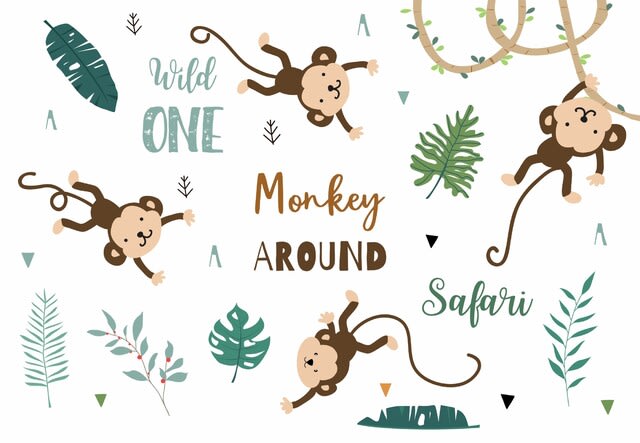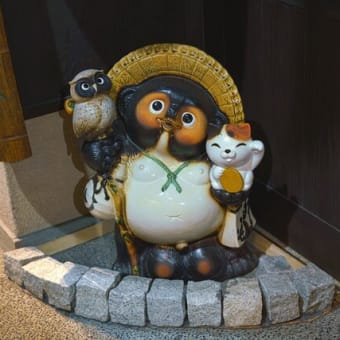Dali Today, let’s talk about monkey idioms.
ダリちゃん 今日はサルにまつわるイディオムについて話そうよ。
Me Oh, I love monkeys!
私 わー、サルは好き!
Dali Yes. First, “to monkey around.” I like this. Your boss might say, “Get back to work! Stop monkeying around.” Or a mother might say to her child, “You are always playing video games. Stop monkeying around! Get to work.” “To monkey around” is “to behave in a silly, careless, or negligent way.”
ダリちゃん そう。まずto monkey around。わしはこの言葉は好き。あなたの上司が「仕事に戻り給え。ふざけるのはこれくらいにして」と言うかも。あるいは、母親が子供に「いっつもビデオゲームばかりして。ぐだぐだしてないで、勉強を始めなさい!」と言うかも。Monkey aroundとは「バカみたいに、不注意に、あるいは怠慢な行動をすること」だ。

Me Why monkey?
私 なぜ、サルなの?
Dali Well, as you know, if you compare monkeys to humans, monkeys are so stupid. So, I think the word, “monkey” is related to stupidity.
ダリちゃん うーん、知っての通りサルと人間を比べると、サルはほんとバカだろう。だから、「サル」という単語は「間抜け」と関連してるんだと思う。
Me Monkeys are stupid!
私 サルはバカ!
Dali Yes, you are right. Next idiom is “monkey business.” It means “behavior that is not acceptable or is dishonest.” For example, “The accountant was fired because of monkey business.” This means he was fired because of his suspicious activity.
ダリちゃん そう、その通り。次のイディオムはmonkey businessだ。容認できない、あるいは不誠実な振る舞いをいうんだ。たとえば「会計士は不正行為により解雇された」など。これは「彼は、怪しい行動により辞めさされた」という意味だ。
Me Wonderful!
私 ワンダフル!
Dali Next, “monkey see, monkey do.” I like this one. It means “to imitate somebody/something.” Do you know the cat idiom, “copycat”? “Monkey see, monkey do” and “copycat” are exactly the same meaning. But the usage is somewhat different.
ダリちゃん 次はmonkey see, monkey do。これ好き。誰かや何かをまねすることだ。猫のイディオムでcopycatって知ってる? monkey see, monkey doとcopycatはまったく同じ意味。でも使い方はちょっと違う。
Me Oh, how different?
私 へえー、どう違うの?
Dali Well, if you mimic somebody, somebody might say, “Stop being a copycat,” or “You are a copycat.” These are perfectly grammatical and make sense by themselves. But in the case of the monkey idiom, somebody would just say to you, “Monkey see, monkey do,” which is not grammatically correct.
ダリちゃん そうだね。もしあなたが誰かをまねしたとすると、その誰かは「まねするのはやめてくれ」あるいは「お前はまねっこか?」と言うかも。これらは完ぺきに文法的に正しいし、それだけで意味が通じる。でもサルにまつわるイディオムのケースでは、その誰かはMonkey see, monkey doと言うだけだろう。これは文法的に正しくない。
Me Oh, my goodness!
私 まあ、なんてことなの!
Dali In fact, there is a rhyme, of which this idiom is the start. It is commonly chanted by children: Monkey see, monkey do, monkey fell in a pot of stew. So you see the monkey, by being a foolish copycat, fell into a steaming pot of stew. People who mimic other people are weak, disgusting, and deserve no respect. Such a copycat is often teased by his classmates, saying, “Monkey see, monkey do, monkey fell in a pot of stew.” Mimicking somebody is indicative of an imbecile.
ダリちゃん 実はね、このイディオムには続きの詩があるんだ。子供たちがよく歌ってるんだけどMonkey see, monkey do, monkey fell in a port of stewとね。それで、バカな、まねっこのサルは湯気の立っているシチューのポットに落ちたんだ。想像できるだろう? 他人のまねをする人は、弱く、嫌な奴で、尊敬に値しない。そんなまねっこはよくクラスメートたちにMonkey see, monkey do, monkey fell in a pot of stewとからかわれる。誰かのまねをするという事は大バカ者ということ。
Me Hmm…(Am I an imbecile?)
私 うーん……(僕は大バカ?)
Dali Next, “a barrel of monkeys.” I use it sometimes. “A barrel of monkeys” is actually the name of a game, consisting of little plastic monkeys, whose arms can hook together to make a chain. This is a rather boring game. So, the idiom, “a barrel of monkeys” is often used sarcastically, to mean not being very much fun. For example, if somebody asks you, “How was your mother’s house on New Year’s Day?” You might reply in displeasure, “It was a barrel of monkeys.”
ダリちゃん 次はa barrel of monkeys。わしは時々使う。barrel of monkeysは実際、ゲームの名前で小さなプラスチックのサルからできている。腕をお互いに引っ掛けて鎖にできるんだ。かなり退屈なゲームだけどね。それでa barrel of monkeysというイディオムは皮肉の意味を込めて「あまり面白くない事」を指すのによく使われる。たとえば、誰かがあなたに「お正月、お母さんの家、どうだった?」と聞くかもしれない。あなたは不機嫌そうに「モー最低」と答えるかも知れない。
 Me Didn’t you get an Otoshidama (a New Year’s gift) from your mother?
Me Didn’t you get an Otoshidama (a New Year’s gift) from your mother?私 お母さんからお年玉もらわなかったの?
Dali No! She is really stingy.
ダリちゃん くれなかった。ほんとケチなんだから。
Key words(キーワード)
negligent: 怠慢な、不注意な
dishonest: 不正直な、誠意のない、不正な
accountant: 会計係、計理士
suspicious: 疑惑を起こさせる、怪しい
imitate: まねる、模倣する
grammatical: 文法(上の)、文法にかなった
rhyme: 韻、韻文、子供のための短い詩
steaming: ぽっぽと湯気を立てる、湯気を立てるほど
disgusting: 胸が悪くなるような、実に嫌な
tease: いじめる、からかう
indicative: (を)指示して、表示して、暗示して
imbecile: 低能な、愚鈍な、大バカな、大バカ者
sarcastically: 皮肉な方法で
displeasure: 不愉快、不満、不機嫌、立腹
stingy: けちくさい、しみったれた、みみっちい
connotate: 含む、提案する、暗示する
mimicry: まね、ものまね、
Comments(コメント)
In Japanese idioms also, monkeys connotate “stupidity” and “mimicry,” as exemplified by Saru-shibai and Saru-mane. It seems that both Americans and the Japanese don’t have good images for monkeys. However, I am not sure whether monkeys are really stupid, as I’ve never had a monkey friend. But I love monkeys.
日本語のイディオムでもまた、サルは「間抜け」や「模倣」を含意する。たとえば「サル芝居」や「サルまね」など。アメリカ人でも日本人でもサルにはいいイメージを持っていないようだ。でも、僕はサルの友達を持ったことがないので、本当にサルが間抜けかどうかわからない。でも僕はサルが好き。























